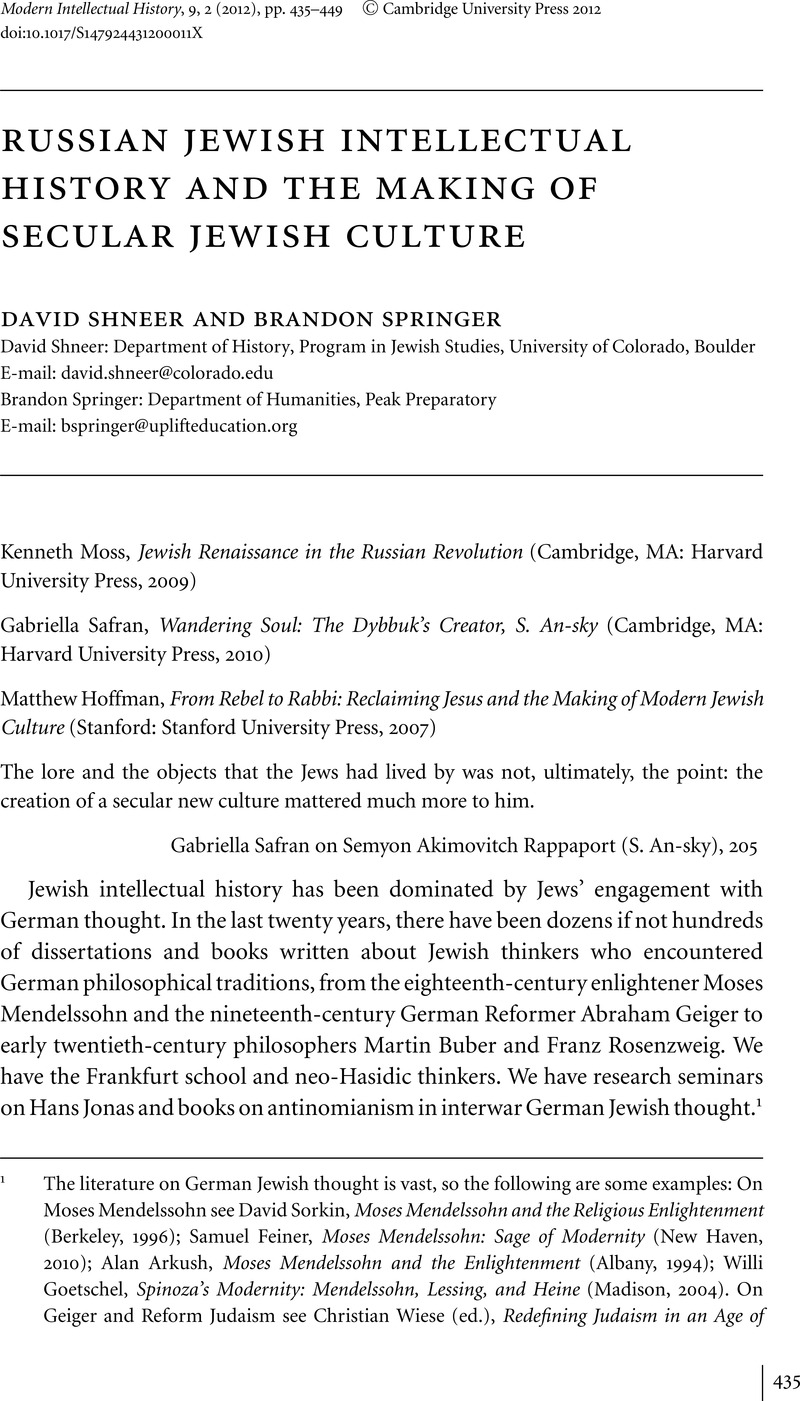No CrossRef data available.
Article contents
RUSSIAN JEWISH INTELLECTUAL HISTORY AND THE MAKING OF SECULAR JEWISH CULTURE
Review products
Published online by Cambridge University Press: 10 July 2012
Abstract

- Type
- Review Essays
- Information
- Copyright
- Copyright © Cambridge University Press 2012
References
1 The literature on German Jewish thought is vast, so the following are some examples: On Moses Mendelssohn see Sorkin, David, Moses Mendelssohn and the Religious Enlightenment (Berkeley, 1996)Google Scholar; Feiner, Samuel, Moses Mendelssohn: Sage of Modernity (New Haven, 2010)Google Scholar; Arkush, Alan, Moses Mendelssohn and the Enlightenment (Albany, 1994)Google Scholar; Goetschel, Willi, Spinoza's Modernity: Mendelssohn, Lessing, and Heine (Madison, 2004)Google Scholar. On Geiger and Reform Judaism see Wiese, Christian (ed.), Redefining Judaism in an Age of Emancipation (Leiden, 2005)Google Scholar; Heschel, Susannah, Abraham Geiger and the Jewish Jesus (Chicago, 1998)Google Scholar; and Meyer's, Michael many works including Response to Modernity: A History of the Reform Movement in Judaism (Detroit, 1995)Google Scholar. On Buber and Rosenzweig see Mendes-Flohr, Paul, Divided Passions: Jewish Intellectuals and the Experience of Modernity (Detroit, 1991)Google Scholar; idem, From Mysticism to Dialogue: Martin Buber's Transformation of German Social Thought (Detroit, 1989), as well his many edited volumes of Buber's work; idem, The Philosophy of Franz Rosenzweig (Waltham, 1998); Batnitzky, Leora, Idolatry and Representation: The Philosophy of Franz Rosenzweig Reconsidered (Princeton 2009)CrossRefGoogle Scholar; Gordon, Peter Eli, Rosenzweig and Heidegger: Between Judaism and German Philosophy (Berkeley and Los Angeles, 2003)Google Scholar. On antinomianism see Lazier, Benjamin, God Interrupted: Heresy and the European Imagination between the World Wars (Princeton, 2008)Google Scholar. On Hans Jonas see Princeton's Tikvah: Project on Jewish Thought's special working group dedicated to Jonas: www.princeton.edu/tikvah/projects/jonas.
2 An alternative script has the tradition moving to France thanks to Emmanuel Levinas; see Bouretz's, Pierre monumental Witnesses for the Future: Philosophy and Messianism, trans. Smith, Michael B. (Baltimore, 2010)Google Scholar. It was the exile of German Jewish intellectuals that gave rise to centers of Jewish intellectual history like Hebrew University and the University of Chicago, as well as the New School for Social Research in New York.
3 Socher, Abraham, The Radical Enlightenment of Solomon Maimon: Judaism, Heresy, and Philosophy (Stanford, 2006)CrossRefGoogle Scholar; Sinkoff, Nancy, Out of the Shtetl: Making Jews Modern in the Polish Borderlands (Providence, 2006)Google Scholar.
4 Shneer, David, Yiddish and the Creation of Soviet Jewish Culture (New York and London, 2004)Google Scholar, chap. 3.
5 The term “Judeo-Christian” came into vogue in the United States during World War II through the influence of many interfaith organizations. On the term's emergence within the Jewish intellectual sphere, see Heller, Bernard, “The Judeo-Christian Tradition,” Jewish Frontier (New York) 13/11 (Nov. 1946), 59–60Google Scholar; Tillich, Paul, “Is There a Judeo-Christian Tradition?”, Judaism (New York) 1/2 (April 1952), 106–9Google Scholar. The two engaged in a back-and-forth for several years. See also Herberg, Will, Protestant–Christian–Jew (New York, 1960)Google Scholar for an example of how the term was used in sociology of religion in the postwar period. See also Sarna, Jonathan, American Judaism (New Haven, 2004)Google Scholar.


